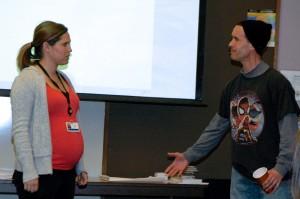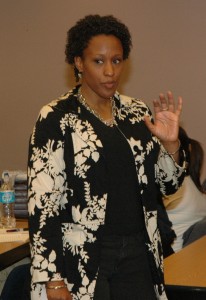Nursing students in Barbara Joyce’s public health course learned about patients who must choose between groceries or health care Wednesday afternoon in a unique partnership between UCCS and Kaiser-Permanente.

Joyce, associate professor, Beth-El College of Nursing and Health Sciences, worked with Kaiser-Permanente representatives to bring theater to the classroom to make a point. Many patients may not have the ability to pay for health care or understand the importance of preventative care.
As actors portrayed roles of a minimum wage earning single parent forced to choose between rent and a child’s asthma medicine, or that of a homeless man frustrated with billing issues, students experienced the reality of the demands that will be placed on them as health care professionals.
“This was about examining a lot of our own assumptions about others and learning to be aware of them,” Joyce said. “We’re not here just to treat the illness but to help the whole person.”
As the nation moves to expansion of Medicaid and health insurance exchanges, millions of Americans may be accessing health coverage and care for the first time. The demands that will be placed on health care providers is forcing reexamination of approaches to low-income patients.
Through Kaiser Permanente’s Care Equity Workshops, the insurer hopes to help nursing students develop skills to address biases and promote equitable and empathetic care for patients of all walks of life.
Kaiser Permanente developed the Care Equity Workshops in 2010 for training its own clinical staff. Beginning in 2011, Kaiser Permanente partnered with Beth-El to provide the workshop to nursing students. Through small-group discussions, personal introspection and theater performances, students analyze the effect that culture, economics and social status have on clinical interactions. More than 180 UCCS students have attended the workshops.
A cornerstone of the Care Equity Project is Loose Change, a performance delivered by Kaiser Permanente’s Educational Theatre Programs during the workshop. Loose Change shares stories of real people living with limited financial resources and the challenges they face in the health care setting. The play raises awareness and sets the stage for discussion about applying the tools learned in practice to actual patient care settings.
“Inter professional collaboration with the Care Equity program has provided the opportunity to bring aspects of the clinical setting into the classroom for analysis and discussion,” Joyce said. “The interactive component of the project enhances application of essential community and public health nursing content.”

The Care Equity Workshops were designed following needs assessments and discussions with Colorado community safety net clinics, Medicaid case managers and colleges. Post-workshop surveys indicate that students have been able to become more sensitive and in-tune with the needs of diverse patient groups over time.
“Kaiser Permanente strives to be at the forefront of offering innovative educational programs for health care consumers and providers,” Jandel Allen-Davis, M.D., vice president of government and external relations for Kaiser Permanent Colorado, said. “The Care Equity Workshops help students understand that their patients are real people who have real needs inside and outside an exam room that must be addressed. Offering respectful, empathetic care has the potential to shift clinical interactions and improve the health of patients.”
In 2010, Kaiser Permanente began investing $1 million to provide scholarships and loan repayments to allied health and nursing students in southern Colorado who elect to spend a set amount of hours working in safety net clinics following their graduation. Thirty five students have received full scholarships through this program to-date.

Leave a Reply